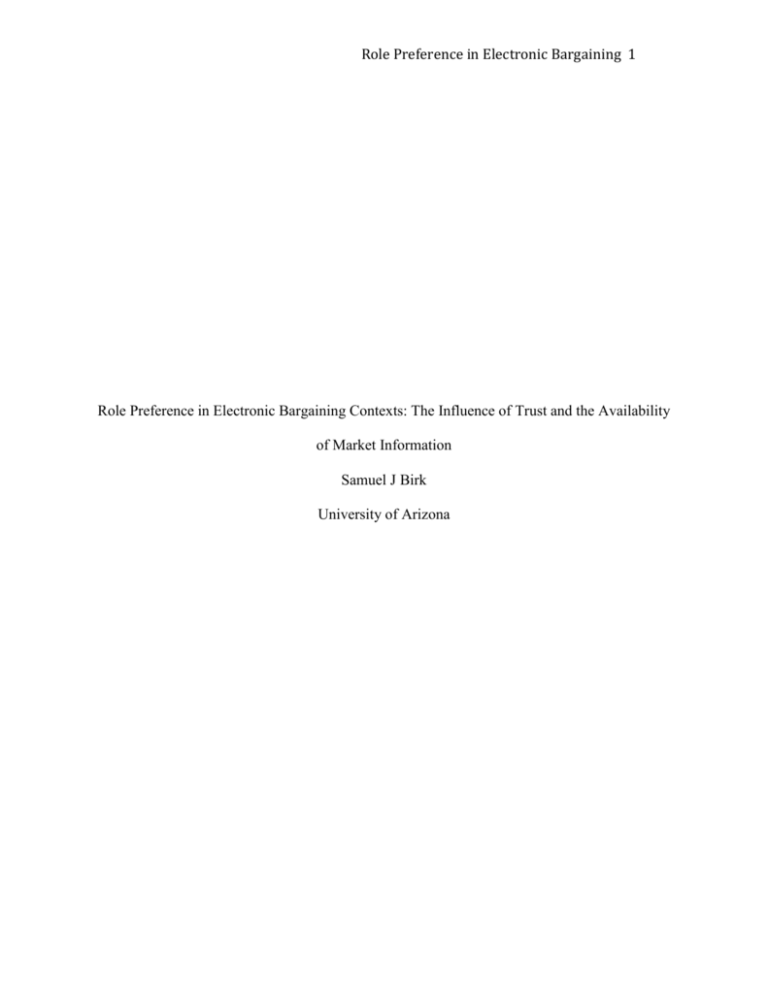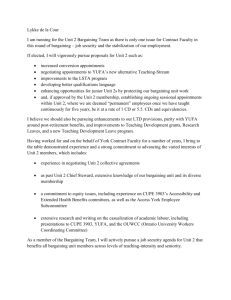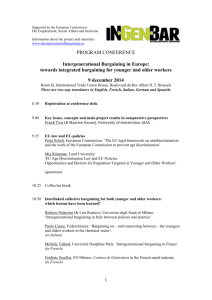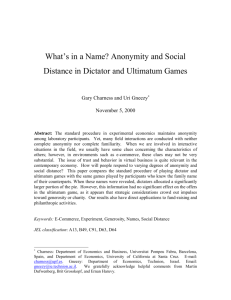Role Preference in Electronic Bargaining Role Preference in
advertisement

Role Preference in Electronic Bargaining 1 Role Preference in Electronic Bargaining Contexts: The Influence of Trust and the Availability of Market Information Samuel J Birk University of Arizona Role Preference in Electronic Bargaining 2 Role Preference in Electronic Bargaining Contexts: The Influence of Trust and the Availability of Market Information With the increased use of e-commerce sites by consumers, bargaining activities are frequently occurring between anonymous and spatially distal parties. In order to reduce transaction costs for both consumers and service providers, most of the e-commerce sites that employ variations of ultimatum bargaining games (e.g., Croson, Boles, & Murnighan, 2003; Guth, Schmittberger, & Schwarze, 1982; Pillutla & Murnighan, 1995). In an ultimatum bargaining game, one party (the proposer) makes a single proposal to another party (the receiver). The receiver then has the option to accept or reject the offer. The acceptance of the offer results in a completed transaction, while the rejection of an offer results in a failed transaction (Thaler, 1988). Although the traditional ultimatum game has been studied extensively, the online format introduces several novel areas for research. For example, recent research found that participants interacting with online intermediaries (sites that present the prices from several companies to consumers, e.g. Priceline.com) in the proposer role paid more for hotels and found the experience to be less fair than participants in the receiver role (Ellis, Humphrey, Conlon, Tinsley, 2006). This finding contradicts previous research on ultimatum games, which demonstrates that the proposer typically receives more money (e.g. Guth et al., 1982) and experiences the distribution of wealth as more fair than the receiver (e.g. Declerck, Kiyonari, Boone, 2009). Furthermore, a recent study finds consumers interacting with online intermediaries prefer the receiver role to the proposer role (Conlon, Tinsley, Humphrey, Ellis, & Birk, Unpublished). Again this finding contradicts robust evidence from research examining preferences in traditional Role Preference in Electronic Bargaining 3 ultimatum bargaining games, in which, participants prefer to act as the proposer (e.g. Hoffman et al, 1994). Despite the increased interest in understanding the effects of online bargaining experiences, little theoretical or empirical research has provided insight into when and why role preferences change in these contexts. The extant literature has focused solely on intermediary sites, ignoring direct-buy sites (i.e. corporation websites that sell the same products as the intermediary) and has restricted participants’ access to market information. Furthermore, the extant research has been unable to adequately explain why the role preferences of consumers in electronic ultimatum bargaining scenarios differ from traditional ultimatum bargaining games. In order to further examine when and why these role preferences might shift in e-commerce contexts, I provide conceptual arguments using a trust framework, and propose an empirical study to examine these predictions. The Role of Trust Trust is an important component of any bargaining situation. This is especially true in online bargaining contexts in which anonymity, distal proximity, and underdeveloped legal precedent make it difficult for actors to enforce fairness and discourage opportunism of other parties. In these types of situations, trust becomes particularly important for the successful completion of economic transactions. Furthermore, trust in the other party is likely to influence role preferences. Trust is defined here as the perceived ability, integrity, and benevolence of a target of trust (c.f. Doney, Cannon, 1997; Ganesan 1994; Kumar, Scheer, and Steenkamp 1995). I will focus on the ability and benevolence components of trust, as the integrity component is tangential to the purposes of this paper. I argue that when consumers perceive that the online service is both capable and benevolent, the consumer prefers the receiver role over the proposer Role Preference in Electronic Bargaining 4 role. Specifically, when consumers perceive the site to be competent and knowledgeable, consumers are more likely to believe that the online site can find the best price for them. Further, if the consumer believes that the site is benevolent (i.e. has the consumers best interest at heart), the consumer is more likely to believe that the online site will share the best price with the consumer. Therefore, when the consumer believes that the site is both capable and benevolent, the consumer can avoid the costs associated with determining the best price on their own. In turn, the more the consumer trusts the site the more s/he will prefer to defer to the e-commerce site. Hypothesis 1: When consumers perceive that the e-commerce site is both capable and benevolent in regard to the transaction, consumers will prefer to defer to the e-commerce site and prefer the receiver role. In the next sections, I propose contexts in which the recent findings related to role preference in electronic ultimatum bargaining contexts might be reversed. Furthermore, the following sections provide conceptual arguments using a trust framework to predict role preference. Trust in Intermediaries vs. Direct Buy Sites In e-commerce contexts, user perceptions of the online services' ability are based on “two related beliefs: (1) whether the firm is competent (expert or skilled) enough to perform the intended behavior, and (2) whether the firm has access to the knowledge required to perform the behavior appropriately” (p. 217, Bhattacherjee, 2002). Intermediaries make it known that they have data from several if not, most or all, of the currently available e-commerce sites in the industry. For example, Priceline.com has a database of current prices from Southwest, Delta, American Airlines, and several more. In other words, intermediaries have access to the knowledge required to perform a search for the best price of an airline ticket or hotel room. Role Preference in Electronic Bargaining 5 Direct-buy sites, however, only access a database that contains prices for that particular airline, or potentially airlines owned by a single corporation. Therefore, the intermediary sites have more “knowledge” about the best available price than direct-buy sites. In turn, the intermediary is likely perceived to be more able than any direct-buy site. Furthermore, intermediaries are likely to be perceived as more benevolent than direct-buy sites for at least two reasons. First, intermediaries by their very nature seem to have no allegiance to any particular direct buy site. Second, the economic interest of the intermediary is in-line with that of the consumer. The intermediary’s economic objective is to find the best price possible in the shortest amount of time. In return for this service the intermediary receives a referral fee. The direct-buy site, however, is only interested in making the largest profit on each sale. In turn, consumers likely perceive intermediaries as more benevolent than direct buy sites. Hypothesis 2: Consumers trust intermediaries more than direct-buy sites leading to a stronger preference to act as the proposer when interacting with direct buy sites and as the receiver when interacting with intermediaries. The Market Another potential influence on the consumer’s role preferences is the amount of market information that is easily accessible. In previous research, the participants were limited in terms of the amount of market information made available to them (Conlon et al., Unpublished; Ellis et al., 2006). Nonetheless, for the reasons stated earlier the availability of market information is unlikely to have a large impact on role preference when the consumer trusts the e-commerce site. Specifically, the consumer’s trust allows him or her to avoid the costs of searching for the lowest price. In turn, consumer’s who trust the service provider should defer to the service provider and ignore or pay little attention to market information. On the other hand, consumers who do not Role Preference in Electronic Bargaining 6 trust the service provider should seek out market information. Confident about the price of the product and distrustful that the service provider will give them the lowest price, these consumers are more likely to prefer the proposer role than (1) consumers who trust the site or (2) consumers who distrust the site but do not have access to market information. Hypothesis 3: The amount of market information available to the consumer will moderate the effect of trust on role preference, such that the influence of trust on role preference will be stronger when market information is available. Method Participants will be 200 undergraduate students. The study will employ a 2 (Type of Site: Intermediary Vs Direct Buy) X 2 (Amount of Market Information: No Market Info Vs Market Info). All participants will be randomly assigned to condition. The study will employ procedures similar to those used by Conlon et al. (Unpublished). Specifically, participants will be told that they are to assume the role of an individual interested in purchasing a hotel room for a trip to Miami, FL. Participants will then either be directed to a direct buy site, which they will be told is being marketed by Hilton (Direct Buy condition) or to an intermediary site they are told is being marketed by Priceline.com (Intermediary Condition). Participants will then either be directed to a site to purchase the hotel (No Market Info condition) or will be given the opportunity to see the price of 10 four-star hotels in the Miami area (Market Info condition). The amount of time spent examining the price of the 10 four-star hotels will be recorded. Participants will then be instructed that they can either propose a price to the site, or the site can propose a price to them. They will also be instructed that if the offer is not accepted, the transaction will not be completed and they will be unable to get a hotel room in Miami. The dependent variable is whether the participants choose to act as a proposer or as a receiver. Role Preference in Electronic Bargaining 7 References Bhattacherjee, A. (2002). Individual trust in online firms: Scale development and initial test. Journal of Management Information Systems, 19, 211-241. Conlon, D.E.; Tinsley, C.H.; Humphrey, S.E.; Ellis, A.P.J.; & Birk, S.J.. (Unpublished). Is it better to receive than to give? Croson, R., Boles, T., & Murnighan, J.K. (2003). Cheap talk in bargaining experiments: Lying and threats in ultimatum games. Journal of Economic Behavior & Organization, 51, 143159. Declerck, CH; Kiyonari, T; Boone, C. (2009). Why do responders reject unequal offers in the Ultimatum Game? An experimental study on the role of perceiving interdependence. Journal of Economic Psychology, 30, 335-343. Ellis, APJ; Humphrey, SE; Conlon, DE; Tinsley, CH. (2006). Improving customer reactions to electronic brokered ultimatums: The benefits of prior experience and explanations. Journal of Applied Social Psychology, 36, 2293-2324. Güth, W., Schmittberger, R., & Schwarz, B. (1982). An experimental analysis of ultimatum bargaining. Journal of Economic Behavior and Organization, 3, 367-388. Hoffman, E., McCabe, K., Shachat, K., & Smith, V.L. (1994). Preferences, property rights, and anonymity in bargaining games. Games and Economic Behavior, 7: 346-380. Pillutla, M.M., & Murnighan, J.K. (1995). Being fair or appearing fair: Strategic behavior in ultimatum bargaining. Academy of Management Journal, 38, 1408-1426. Thaler, R. H., 1988. Anomalies: The ultimatum game. Journal of Economic Perspectives, 2, 195-206.
![Labor Management Relations [Opens in New Window]](http://s3.studylib.net/store/data/006750373_1-d299a6861c58d67d0e98709a44e4f857-300x300.png)





